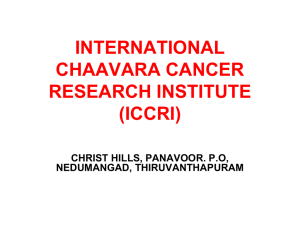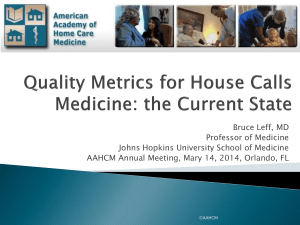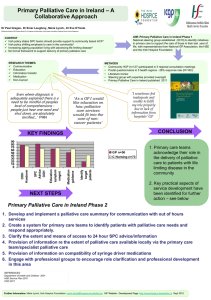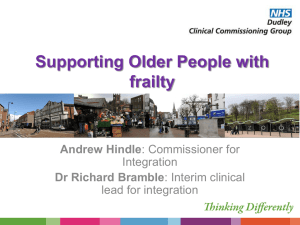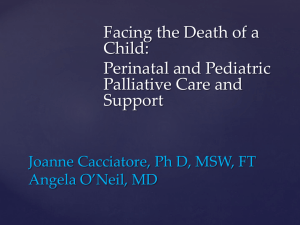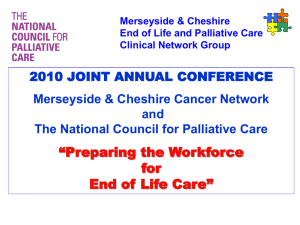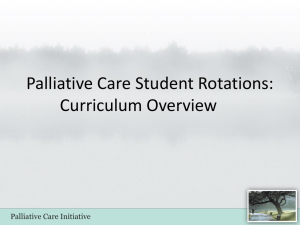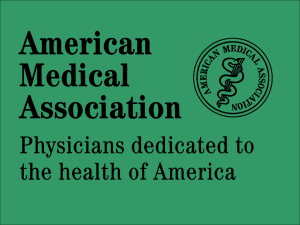Educating Future Physicians for Palliative/End of Life Care: Project
advertisement
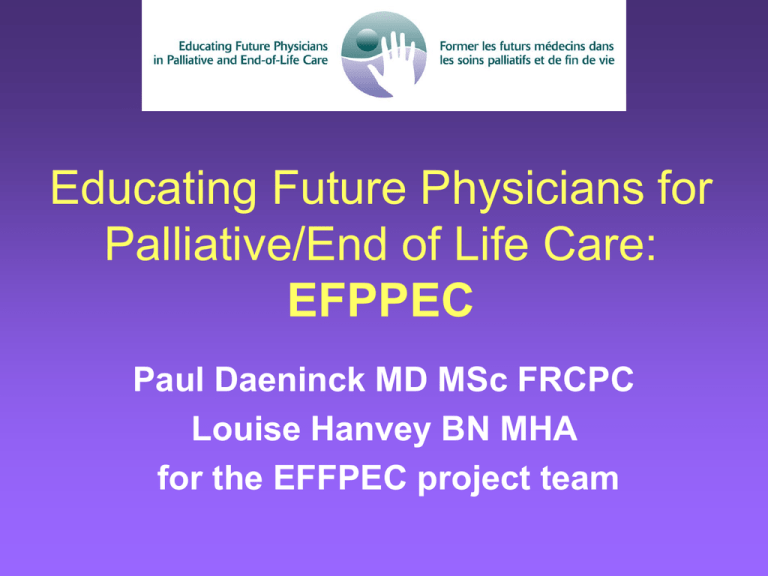
Educating Future Physicians for Palliative/End of Life Care: EFPPEC Paul Daeninck MD MSc FRCPC Louise Hanvey BN MHA for the EFFPEC project team Topics Need for Palliative Care EFPPEC overview Progress Future work What do Patients & Families Want? Competence Compassion Pain and symptom management Clear decision making Preparation for death Affirmation of the whole person Steinhauser KE et al. Ann Intern Med 2000;132:825-32 A Good Death: Patient Perspectives 5 dimensions of a good death Pain/symptom management Avoiding prolongation of dying Achieving a sense of control Relieving burden on others Strengthening relationships with loved ones Singer PA et al JAMA 1999;281:163-8 End of Life Wishes: Seriously Ill Pts & Families Questionnaire of patients and families N=440/160, cancer and chronic diseases Trust and confidence in the doctors looking after you Not to be kept alive on life support when there is little hope for a meaningful recovery Information about your disease communicated to you by your doctor in an honest manner To complete things and prepare for life’s end CMAJ 2006:174; DOI:10.1503/cmaj050626 Growing needs “Trends suggest that by 2010 cancer will be the leading cause of death in Canada” Canadian Cancer Society 2004 “By 2016, > 20% of population will be 65 years or older” Health Canada 2000 Canadians Expect It ! “Quality End-of-life Care: The Right of Every Canadian” Canadian Senate Report 2000/05 Social responsibility of medical schools “In some respects, this century’s scientific and medical advances have made living easier and dying harder” “Approaching Death”-The Institute of Medicine How Well Are We Preparing Our New Physicians? Palliative Care in Medical Schools None: 3 Mandatory rotation: 2 Elective only: 11 Less than 5% (0%-15%) of students participate n=16, 2001 Oneschuk D, et al. J Pall Care. 2004;20:32-37 Palliative Care in Medical Schools “Integrated” in other sessions: Independent program: Supervised patient encounters: Mean # of hours: Multidisciplinary faculty: 6 6 4 11 (3-22) 3 n=16, 2001 Oneschuk D, et al. J Pall Care. 2004;20:32-37 Palliative Care in Medical Schools Exposure Year # of Med Schools One 8 (50%) Two 12 (75%) Three 6 (38%) Four 5 (31%) Oneschuk D, et al. J Pall Care. 2004;20:32-37 What do Medical Students Want? 83% of students favoured ↑ pall. care education Oneschuk et al. J Palliat Med 2001 Exit surveys by AAMC/AFMC: medical students feel unprepared in the areas of palliative & EOL care Direct or indirect experience with terminal illness increased their request for more palliative care Oneschuk et al. J Palliat Med 2002;5:353-361 All Specialties Provide Palliative Care All physicians during the course of their professional lives will be involved in caring for a patient with an incurable illness Palliative care not just “at the end” Palliative Medicine Training For Family Medicine Residents Mandatory rotation in palliative care? 5/16 Median length of rotation 2 wks Elective time in palliative care for family 16/16 medicine residents Median length of rotation 3 1/2 wks Median number of residents participating Specific faculty positions for palliative medicine 10% 9/16 Oneschuk D, Bruera E. Pall Med 1998 Palliative Care: Not Just About Dying & Death What can Palliative Care Offer? Interdisciplinary Collaboration Self-awareness / Reflection Spiritual & Psychosocial Care Experience of Suffering Ethics Complementary & Alternative Medicine Challenge: Integrate, not usurp A curriculum that is already full Map out opportunities for integration Block SD et al. J Gen Int Med. 1998;13:768-73 Summary Messages Patients need & want better EOL care Students & residents need & want better EOL skills Role models needed Experiential learning opportunities Project Outline LH Project Overall Goal By the year 2008, all undergraduate medical students and the residents at Canada’s 17 Medical Schools will receive effective training in palliative and end-of-life care and will graduate with competencies in these areas EFPPEC Partners Association of Faculties of Medicine Canada (AFMC) principal partner/CHPCA co-partner Health Canada funding & close involvement of Canadian Strategy on Palliative/End of Life Care Working Group on Formal Caregiver Education Office is located at CHPCA in Ottawa EFPPEC Project Team Project Manager: Louise Hanvey Physician Leader: Larry Librach Administrative Assistant: Jennifer Kavanagh EFPPEC Management Committee Alan Neville (Chair) - McMaster University Paul Daeninck - U of Manitoba Doreen Oneschuk - U of Alberta Hubert Marcoux – Université Laval Robert Wadel - U of Calgary Maryse Bouvette - CASN Sue Maskill - AFMC Sharon Baxter - CHPCA EFPPEC Partners Professional Partnerships CASN Canadian Ass’n of Faculties of Pharmacy CAPPE CASW Professional Resource Groups CSPCP RCPSC/CFPC MCC Philosophy Build on present state in medical schools by forming/facilitating local teams Identify common competencies in EOLC and examine to those competencies Assist in the development of curricula and clinical experiences Evaluation is a key component EFPPEC Objectives Develop an interprofessional team (from various disciplines/specialties) at each university to identify gaps/opportunities related to palliative and EOLC at their university Develop a strategy to address the gaps and implement the strategy EFPPEC Objectives Support development of consensusbased palliative and EOLC common competencies for undergraduates in medicine and for postgraduate trainees in key clinical specialties EFPPEC Objectives Facilitate introduction of curriculum based on common competencies for all undergraduate & clinical postgraduate trainees at each medical school Empower faculty from various specialties to become palliative and EOLC mentors/role models EFPPEC Objectives Facilitate the introduction of palliative and EOLC questions in licensing/certification exams Develop network of educators Develop a resource of programs “Top down, bottom up” approach Top Down Approach All 17 deans in agreement Certification colleges in agreement accreditation of residency programs with a component of EOLC AFMC will accredit medical schools with EOLC as component Bottom Up Approach National input and consensus Local team formation Interdisciplinary focus Identification of local champions Changes at the local university level Assist in faculty development Common Competencies Competencies developed based on those of the Canadian Strategy on Palliative/End of Life Care Working Group on Formal Caregiver Education 1: Address & Manage Pain & Symptoms 2: Address Psychosocial & Spiritual Needs 3: Address End-of-life Decisions & Planning using Bioethical & Legal Frameworks 4: Communicate Effectively with Patients, Families, & Other Caregivers 5: Collaborate as a Member of an Interdisciplinary Team 6: Attend to Suffering Progress: Where are we at? Local Teams Team leader identified at each med school All but 3 medical schools active Team leaders form interdisciplinary stakeholder teams to: Familiarize them with the goals of EFFPEC Inventory their local curricula in EOLC Build consensus around the competencies Local Teams Project team to obtain relevant info from professional resources with feed back to local teams Local teams to share info with others across Canada, e.g. effective programs, innovations Local teams to enhance and deliver local EOLC curricula Video Conferences Two so far Successful in getting people to share their successes and challenges Facilitates communication Not all teams involved as yet University of MB Team Local Leader: Dr. Marcelo Garcia Team members identified Local curriculum reviewed, gaps identified Working with University to integrate Presently have approx. 15 contact hrs Related areas may double contact Experiential learning electives possible Learning Commons Developed with the help of the Pallium Project Website for sharing information and educational programs Unique features Forum Searchable Notification of subscribers Communications Developing communication strategy: Logo and branding Website (www.efppec.ca) Newsletters & other forms of regular communications with local teams Symposia Conference presentations & booths Visits to university faculties Evaluation Instrumental evaluation What has been accomplished so far at each of the identified nodal points Quantitative & qualitative Appropriate & realistic outcomes Done in collaboration with Wilson Centre in Toronto Final report to include outcomes Faculty Development Assess needs for faculty development and facilitate development of these resources Hope to use local expertise Challenging for several groups Palliative care not yet full academic status 2006 Symposium Held in London ON in May Meeting of the AFMC/CAME/CFPC/MCC/RCPSC Over 80 attendees Excellent exchange of ideas Interprofessional presence Priorities: Faculty development 2007 Symposium Planning underway Likely in Fall, ? CHPCA Annual Meeting Interprofessional meeting Review of local team progress Faculty development Sustainability Undergraduate Competencies Project team worked with Ontario and Quebec groups A draft curriculum in place Seeking consensus across country Detailed enabling objectives May add evaluation suggestions Family Medicine Competencies Worked with CFPC to develop postgraduate training competencies Approved by CFPC, linked to Four principles and CanMEDS Will be incorporated into the Red Book, guidelines for program teaching Specialty Competencies Royal College Specialty Committees asked to develop competencies Internal Medicine, Critical Care finished first draft Surgery, Psychiatry, Pediatrics, Oncology currently in process Meeting with RCPS Education Office Looking Ahead What’s Next? Royal College specialty competencies Learning commons Developing palliative / EOLC questions in licensing / certification exams Working with accreditors Interprofessional project funding Individual schools Sustainability Summary An ambitious 4 year project to introduce effective teaching in end of life care and produce physicians who are competent in this area Questions?

